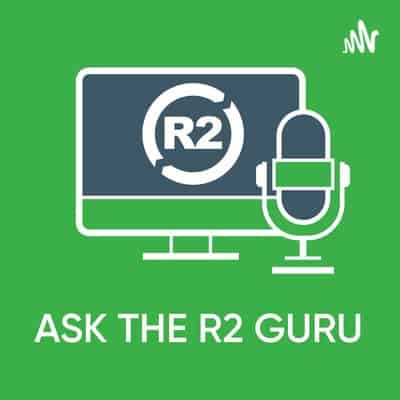R2 Guidance & Knowledge Base
Podcast 7 – The Upcoming Certification Bubble

Ask The R2 Guru is a podcast developed by SERI, Champions of Electronics Sustainability. This podcast is a series of short and helpful tips designed for electronics recyclers and refurbishers interested in the R2v3 Standard and the certification process. So, grab a cup of coffee and give them a listen.
PODCAST TRANSCRIPT:
We’re in the second half of the transition process to the new R2v3 standard and R2 facilities are completing their transition audits at a steady pace. But more than 600 R2 facilities have certifications that expire in the first six months of 2023. Why is this a problem and what is SERI doing to help? That’s the topic of this episode of Ask The R2 Guru. I’m Roger Greive, from SERI – Champions of Electronics Sustainability.
You already know that there is a three-year cycle for the R2 certification process. Your first year is a certification audit followed by two years of surveillance audits. There’s a recertification audit in year four when your audit cycle begins again. Surveillance audits are a little bit shorter than the certification or recertification audit and they take less time to process.
Usually, the number of companies that need to be audited to the R2 requirements is very consistent over time. Because of the three-year cycle, these audits are approximately 1/3 certification audits and 2/3 surveillance audits. The number of auditors used by the various certification bodies around the world is totally sufficient to handle that demand. But between January and June of 2023 there are at this point over 650 R2 facilities whose certifications expire during that six-month window. They all need recertification audits as they transition to the R2v3 standard.
There are several reasons for this. Some facilities simply wish to delay their transition to the R2v3 standard for as long as possible. Others have a three-year audit schedule that actually does expire during the time period from January through June 2023. Finally, a number of facilities that would otherwise have had a certification cycle that expires sometime between June and December of 2023 must transition to R2v3 before the R2:2013 expiration on June 30. The combined result of all of this is that, unless something changes, 650 facilities need to be recertified between January and June of 2023 and, although SERI is continuing to train new auditors every month, these 650 facilities will likely exceed the capacity of our certification bodies and their auditors.
At SERI we realize that this situation exists and we’re looking carefully at ways to help, beginning with giving you as much advance notice of the situation as possible so that you can adjust your audit schedule. There are three other steps we’re taking. The first is that we have developed and implemented an innovative new audit process, allowing for remote transition audits to take place. You’ll find the details in the SERI knowledge base — search for Remote Audit. There are several conditions you need to meet in order to qualify for a remote audit, and you’ll need the approval of your certification body to participate in the remote audit process between now and June of 2023.
The second thing that SERI is offering is up to six months of additional time on your new R2 certification if you schedule your recertification audit early. For example, if your current R2 certificate does not expire until March of 2023 and you choose to move your audit back to September of 2022, SERI will extend your three-year certification period until March of 2026.
And finally, you have a third option if you have a surveillance audit during 2022. A surveillance audit can take place at any time during the calendar year of that audit, so if you have a surveillance audit for any time during 2022 and wish to schedule your R2v3 recertification audit for any time during this year, you will maintain a schedule of having only one audit during a calendar year but that one audit will be your recertification to R2v3. This is especially helpful if you have a surveillance audit for early to mid 2022 and need some extra time to prepare for the new requirements of the R2v3 standard.
We understand that there are concerns with keeping your three-year certification cycle for R2 lined up with the same three-year cycle for your management systems. But, this may present an opportunity to consider certifying to the RIOS standard as opposed to the other ISO management system standards. There are many timing options being developed by SERI and the certification bodies, and this is something else you should discuss in detail with your CB.
You should talk with your management team to weigh the risks of whether a possible lapse in your R2 certification resulting from this recertification traffic jam is worth your delay in the transition to the new standard. Whatever you decide to do, this is a business decision that you should plan for just like any other part of your business.
There are a lot of facilities that will need to complete their transition to R2v3 in advance of the June 2023 deadline so the demand for auditors will be very high. The Certification Bodies who administer and conduct the audits have limited resources. The main piece of advice from SERI is to be sure to start early and get your R2v3 transition audit scheduled as soon as possible.
As always, I hope you’ve enjoyed this episode of Ask The R2 Guru and found it helpful. Thanks to Sean DeVries, Sarah Kim and Jeff Seibert for their assistance in producing this podcast series. If you have any questions or comments or want to suggest a topic for a future podcast, please use the Contact Us form on the SERI website.
